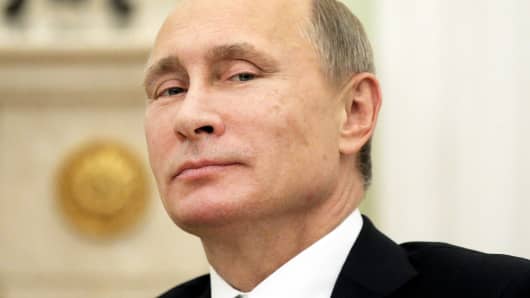Hang on, what year is it? We seem to be back to Russia fearmongering again.
Hillary Clinton is beating the drum of public alarm over Donald Trump's kind words about Russian President Vladimir Putin.
Do you remember that 2012 debate between President Barack Obama and challenger Mitt Romney?
After Romney spoke seriously about the growing threats to the United States from Russia and its leader Vladimir Putin, Obama delivered the following withering comeback that became one of the most potent zingers in American political history: "The 1980s are now calling to ask for their foreign policy back because the Cold War's been over for 20 years."
That won him a lot of "oohs" and "ahhs" from the "Daily Show" crowd but more importantly it was indicative of the Obama team's canny realization that most Americans voters do not naturally focus on foreign policy and even less on foreign leaders unless they are really living in fear of them as opposed to mild disdain or fuzzy recognition of their names in the first place. Moreover, most American voters simply do want to worry about foreign countries or any possible threats from them. In that way, Obama's zinger served the dual role of reassuring the voters and belittling an opponent simultaneously. You just don't get many opportunities to score those kinds of points in any election.
Just over two weeks later, President Obama was re-elected to his second term.
2012 wasn't that long ago. Have we forgotten that turn of events already?
Clinton seems to think the American people are concerned enough about Putin to really be swayed by her renewed public alarm over Donald Trump's kind words about the Russian leader. Her doomsday-like words decrying Trump's Putin praise during her exceedingly brief news conference Thursday was about as dark a tone we've heard from either candidate in this election so far. For a campaign that's made so much hay by criticizing the "dark" tone of Trump's campaign, this is an inexcusable mistake.
And Democrat Senator Harry Reid seems to think the American taxpayers really want the government to investigate possible Russian tampering in this election. Perhaps Reid thinks he can score points for the Democratic presidential ticket simply by making the accusation just like he hurt Romney in 2012 by insisting that Romney didn't pay taxes. But he should've stuck to his 2012 playbook — American voters are much more obsessed with sweetheart deals for the rich and other pocketbook issues. That's why his baseless tax smear on Romney worked four years ago. Harder-to-understand and fuzzier accusations of foreign election tampering aren't on the voters' radar.
And Clinton campaign manager Robby Mook seems to think it was a good idea to go on the national networks last month and repeatedly question whether Trump might be a paid Putin agent. If that isn't worthy of "Daily Show"-like ridicule, nothing is.
In other words, the Clinton campaign and its top allies are running a fool's errand trying to make the American people feel worse about a threat they don't really know that much about and probably don't want to. And while the campaign's relentless scare tactics aimed directly at Trump have been generally successful, this renewed drumbeat of accusations about his connection to Putin take the focus off of their opponent an put it onto someone most voters aren't ever going to think much about. After what's been 16 years filled mostly with divisiveness over our last two presidents, terrorist fears, and severe economic downturns, it's not that the country can't take another thing to worry about, it's just that it doesn't have the attention span for it.
Instead of doubling down on the fear-inducing effects many of Trump's comments have, the Clinton campaign would be wise to ditch this Putin-centered fear mongering and copy the campaign tactics of their leader who still occupies the White House and go for a more lighthearted approach.



